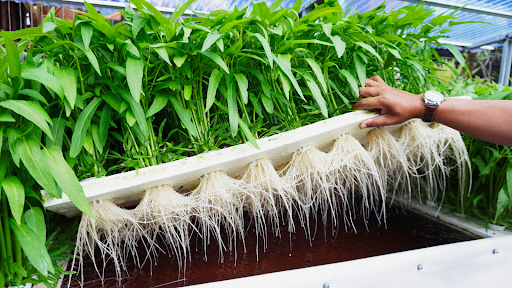Hydroponics, the innovative soilless cultivation method, is revolutionizing agriculture by maximizing crop yields and conserving resources. This comprehensive Hydroponics course explores the principles, practices, and advanced techniques of hydroponic plant cultivation. Whether you’re an aspiring urban farmer, agricultural entrepreneur, or simply passionate about sustainable food production, this course will equip you with the knowledge and skills to thrive in this dynamic field.
Course Highlights:
1. Introduction to Hydroponics (Week 1-2): Begin your journey by understanding the core principles of hydroponics. Explore its history, benefits, and different systems, including nutrient film technique, deep water culture, and aeroponics.
2. Plant Physiology and Nutrition (Week 3-4): Delve into the science behind hydroponics. Learn about plant growth, nutrient uptake, and how to create the ideal growing environment for various crops.
3. Hydroponic Systems and Setup (Week 5-6): Get hands-on experience designing and building your hydroponic systems. From selecting appropriate containers to setting up lighting and monitoring equipment, you’ll gain practical skills to implement your own projects.
4. Nutrient Management (Week 7-8): Master the art of nutrient solution formulation, adjusting pH levels, and preventing nutrient deficiencies. Explore organic and synthetic nutrient options and develop a customized feeding regimen for your crops.
5. Pest and Disease Management (Week 9-10): Learn to identify, prevent, and manage common hydroponic pests and diseases. Emphasize sustainable practices and integrated pest management techniques.
6. Crop Selection and Care (Week 11-12): Discover which crops thrive in hydroponic systems and how to care for them. Explore the cultivation of herbs, leafy greens, tomatoes, and other high-value crops.
7. Advanced Techniques (Week 13-14): Dive into cutting-edge topics such as vertical farming, aquaponics, and controlled environment agriculture (CEA). Explore how technology, automation, and data analysis are shaping the future of hydroponics.
8. Sustainability and Environmental Considerations (Week 15): Explore the environmental benefits of hydroponics, including water conservation, reduced pesticide use, and reduced food miles. Discuss the role of hydroponics in addressing global food security challenges.
9. Business and Entrepreneurship (Week 16): If you aspire to turn your hydroponic skills into a business, this module will cover essential topics like market research, business planning, and financial management.
10. Practical Application and Project (Week 17-18): Apply your knowledge by designing and implementing a hydroponic project. Receive guidance and feedback from instructors and peers throughout the process.
This Hydroponics course combines theoretical knowledge with hands-on experience, ensuring you’re well-prepared to tackle real-world challenges in hydroponic agriculture. Whether you aim to start your hydroponic farm, work in the industry, or simply want to cultivate your food sustainably, this course will empower you to grow with confidence in this exciting field. Join us and become part of the hydroponics revolution, contributing to a more sustainable and food-secure future.
